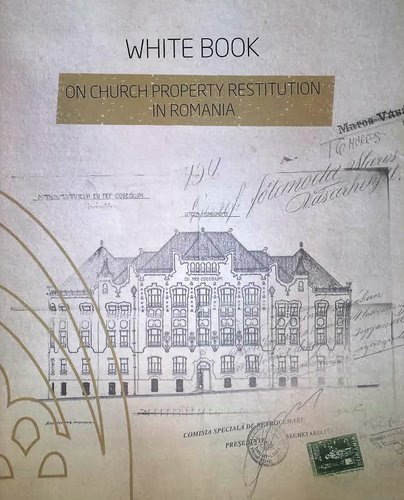With the publication of a new White Book to document the illegalities of property confiscation in Romania, we hope that finally the foundation of our lives may be justice and peace. The long struggle between the Transylvanian Reformed Church District in the Reformed Church in Romania and the Romanian government in regards to Székely Mikó High School continues, but this new publication seeks to highlight the contested property on an international scale.
In the era of communism, properties belonging to the church were illegally confiscated in the name of nationalism and given to the state. With the regime change, some of these properties were returned to their rightful owners, the communities of faith who had cared for the buildings, land, and the community that used these properties for so long. The restitution process is a long one, and as time goes on, it becomes more drawn out and churches are less likely to get their properties back. One of the properties that is still in dispute with the state by our brothers and sisters in the Transylvanian Reformed Church District in the Reformed Church in Romania (RCR) is a local denominational high school, Székely Mikó, that had belonged to the church years ago. The school was run by the Transylvanian Reformed Church District until it was confiscated during the time of communism and, despite many attempts to get it back from the state since restitution efforts began, it is still under governmental control.
Due to the multitude of frustrations that come from the restitution process, the Transylvanian Reformed Church District has recently published a White Book titled White Book on Church Property Restitution in Romania, With Special Regard to Reformed, Roman Catholic, Unitarian, and Evangelical Lutheran Churches. “In 1949, the Communist regime illegally confiscated over 2,100 properties from the four traditional Hungarian-speaking churches in Romania […] The aim of this book is to foster a dialogue for the correct – i.e. non-biased and non-discriminatory – application of the Romanian laws on restitution, in order to attain better administrative practices and to exclude uncertainties,” says the book in its opening Executive Summary.

Throughout the saga of Székely Mikó High School, the Transylvanian Reformed Church District and its partner churches from around the world have spoken out boldly about the unjust actions of the Romanian government.
In an official statement of the Presidium of the Transylvanian Reformed Church District regarding the decision of High Court of Ploiesti on November 26, 2014, the RCR lamented that, “Our loyalty and belief in the Rule-of-Law, which we nurtured toward the Romanian State in the past years, was seriously offended. What hurts most is that our whole community, approximately 700,000 members of the Reformed Church, was slapped in the face, was called deceitful, cheater, and demanding.”
The Reformed Church in Hungary, in an official statement of solidarity, said that they were, “appalled by Romanian Court ruling in regards to Székely Mikó High School,” which is, “historically and ethically inseparable from the Transylvanian Reformed Church District.”
The Church of Scotland, in a letter addressed to Bishop Béla Kató of the Transylvanian Reformed Church District of the RCR, stated their sadness in receiving the news of the challenging situation the church is facing as a result of the decision to “renationalize” the Székely Mikó Reformed High School. Not only did they express their discomfort of the injustices, but they also offered their support and asked to be informed on how the Church of Scotland could be of further help in response and solidarity to the cause of events.
A message of solidarity was also received from the steering Committee of the European Area Council of the World Communion of Reformed Churches who, in addressing Bishop Béla Kató, expressed their dismay at the matter and also sadly mentioned that this has been familiar to them in regards to “…stories of these kinds of actions which have been taking place in Romania for years.”
In summarizing the situation surrounding the Székely Mikó High School, The Research Institue for Hungarian Communities Abroad says that, “On 26 November 2014 a final ruling was adopted in Romania in the restitution case of the Székely Mikó High School […] This ruling – despite some minor corrections – rejects the appeal of the Reformed Church and the defendants, and confirms the judgment of the first instance, declares the members of the restitution committee guilty and re-nationalizes the building of the school. The decision of the court calls into question the emergence of the basic democratic values and the rule of law in Romania.”
With the publication of this new White Book to document the illegalities of the state, the Transylvanian Reformed Church District in the RCR hopes that finally the foundation of these discussions with the government may be justice and peace. It is the RCH’s conviction that this common desire binds us together; Hungarians, Romanians, and all the people of the region – working for a more just and peaceful world.
Article by Kearstin Bailey